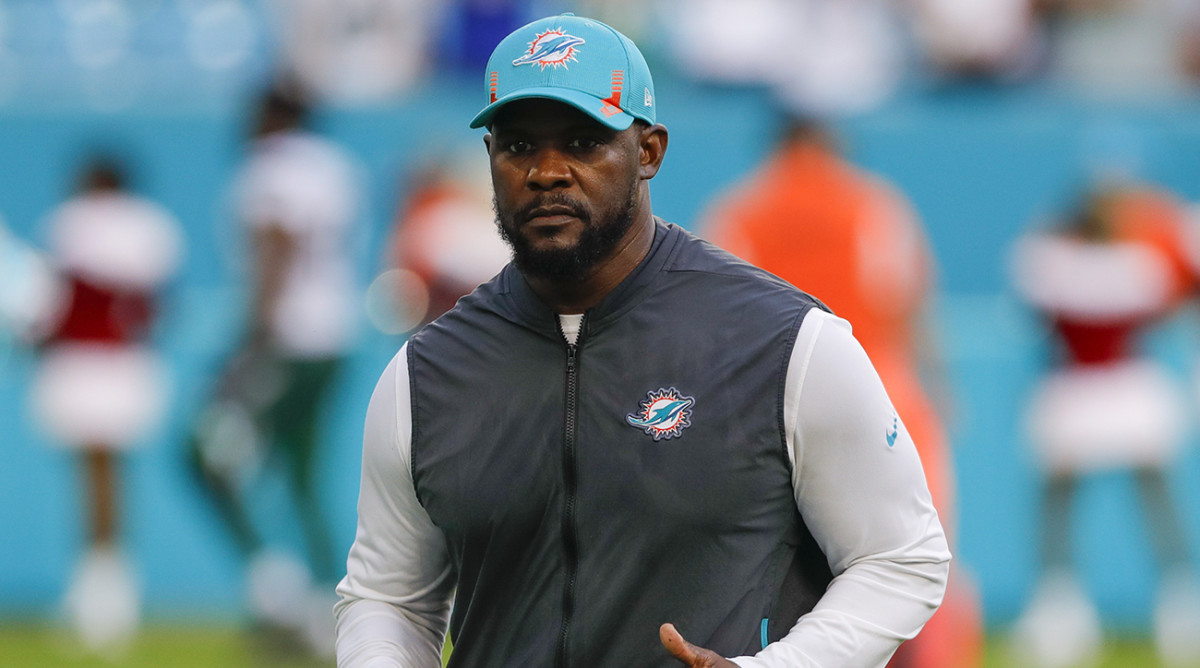This Is Not Just a Time to Create More Pipelines. It Is Time to Simply Hire More Black Coaches.

We’re a year and a half removed from a summer in which college athletics departments, like many other corporations in this country, said they cared about its Black athletes and employees after the murder of George Floyd. They marched and they listened. They made statements and then they made some actions. And, as always, they valued those athletes and employees only to a point. It’s always someone else’s responsibility to improve diversity until you take stock of the fact that few have truly done what’s necessary.
Former Dolphins coach Brian Flores is suing one such corporation, the NFL, laying bare again the inequities in the league’s hiring practices. The blockbuster class action suit should also force us to continue to assess where we are in college football, and it shouldn’t take a lawsuit for us to do it. The “It Takes All Of Us To End Racism” messages painted on professional football fields are supposed to remind us, and yet the responsibility gets shirked by certain people.

Answers to diversity problems in college football are made entirely too difficult by the powers that be when those decision-makers simply have to follow through with making diverse hires in the sport. It is an overly simplistic answer to a complicated issue, but when you complicate things more, the goalposts shift, timelines get longer and the change everyone seems so in favor of magically does not occur.
You can lead a horse to water, as the adage goes, but head-coaching roles remain white overall because owners in the NFL and college athletic directors simply refuse to drink. The Rooney Rule has not failed in the NFL because it doesn’t have enough incentives or penalties attached to it, yet there are currently only three minority NFL coaches (Pittsburgh’s Mike Tomlin and Houston’s Lovie Smith are Black, while Miami’s Mike McDaniel identifies as multiracial). Per research from ESPN, nearly half of the Power 5’s 65 schools have never had a Black coach, and even fewer (24) have had a Black athletic director. It’s not just that we need more athletic directors of color, but it’s also that white ADs must follow through on hiring diversity, not simply pledge to do so.
You’ve likely read something along the lines of the following paragraph before, but here it comes again:
College football’s players are 50% Black. Of the [insert double-digit number] head-coaching jobs that changed at the end of the [insert year] season, [insert single-digit number] were filled by people of color.
This go-around, the “insert” numbers are 29, 2021 and six, including Mario Cristobal in Miami and Timmy Chang in Hawai’i. You can set your watch to roughly that many jobs changing hands in total with an average of 24 jobs opening up per FBS cycle over the past decade. Of the Black coaches who were hired, two of them (Temple’s Stan Drayton and Virginia’s Tony Elliott) were hired by Black athletic directors. Of the 14 Black head coaches in FBS’s 130 jobs, six were initially hired by Black ADs.
The excuses for why we are here are myriad, but here we are again.
You could say there aren’t enough Black athletic directors, which allows white ADs to evade their responsibility for diverse hires. It can’t be the responsibility of Black ADs to solve the problem, anyway, because there aren’t enough of them at the FBS level to even make a dent. It is on their dozens of white contemporaries to step up.
You could also say there aren’t enough Black coaches in the pipelines, which ignores the fact that there are coaches who come from slightly unconventional job backgrounds to find success, like Arkansas’s Sam Pittman (a career offensive line coach) or South Carolina’s Shane Beamer (who had coordinated only special teams).
You could even say ADs should just hire the “best available” candidate, at best a moving target of public opinion that can change from person to person and is hardly objective. Pass the buck enough about whose responsibility it is to hire diverse candidates and—oh, would you look at that—what a coincidence so few of those candidates have jobs.
Hiring searches for athletic directors can go on for months, while impatience runs rampant when a head-coaching search goes longer than a couple of weeks. The speed of the college football coaching cycle harms the hiring processes as the sport gets squeezed by a combination of fan zeal and an inflated transfer portal. With speed comes a smaller search with less due diligence and a shallower pool of candidates. And a big reason why white athletic directors fail to meet this task is out of fear for their own job security. There is always a booster to lay blame, a wrath most athletic directors don’t want to face.
Collegiate athletics leaders don’t get fired for making a bad decision on a swimming coach, but they do for football, the biggest revenue sport in their athletic departments. Still, bold choices demand courage. You do not hire a coach with the intent to fire them soon after, but is it really so bold to hire a Black coach when the trends show you’re probably going to be hiring a new coach within five years regardless of race?
The answer here is again simple: no.
More NFL coverage:
